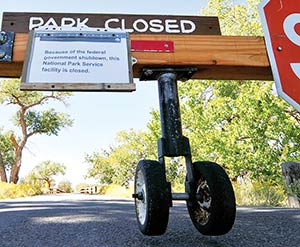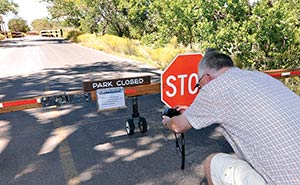Most NN programs safe during shutdown
By Bill Donovan
Special to the Times
WINDOW ROCK, Oct. 3, 2013


(Times photo - Donovan Quintero)
TOP: A paper sign states Tuesday
afternoon in Ganado that the Hubbell Trading Post National Historic Site is
closed due to a government shutdown. Canyon de Chelly National Monument was
also closed until further notice. The Navajo Nation tribal parks remain fully
operational and open to the public.
BOTTOM: German tourist Dirk Barth
who lives north of Frankfurt, Germany, takes a picture of the posted sign
stating the Hubbell Trading Post National Historic Site being closed due to the
government shutdown. Barth and his wife, who are on a five-week tour of the
country, said luckily they had the chance to visit some of the national parks
like the Grand Canyon before the shutdown.
Erny Zah, director of communications for Navajo President Ben Shelly, said most programs within the tribe that relied on federal funds were operating as usual. The reason is because these programs receive forward funding, which means that they have already received their monies for the year so the shutdown has no affect on them.
The Indian Health Service hospitals and clinics were exempted from the shutdown and a press officer for the IHS in Washington said no one at any of the facilities was required to step down from their job because of the shutdown.
However, there have been some from the IHS headquarters in Window Rock who have been furloughed until the shutdown is over.
The Bureau of Indian Affairs offices were hit harder, with most BIA program officials, except for those who were needed for safety, were furloughed and there are only a handful of people still remaining in the headquarter offices.
Maggie George, president of Diné College, said that the college is operating at full staff since they were forward-funded as well. If the shutdown continues for two or more months, she said that this may affect the issuance of some federal scholarship funds for the next semester.
Zah said BIE contract schools as well as those hospitals operating under a PL 638 contract are all forward-funded so they will be able to operate as normal. That is also true of HeadStart.
Probably the most visible reminder that the shutdown is going on can be seen in the national parks on the reservation, which were all shut down on Tuesday.
That includes Hubbell Trading Post and by the afternoon tourists were still coming by to see the trading post only to encounter a sign saying it was closed because of the shutdown.
As a result of the federal park shutdown, the Navajo Nation's Parks and Recreation Department sent out a press release urging people who came to see a park to visit a tribal park, adding that all of them were open.
Navajo Nation officials began holding meetings during the past week to assess just what kind of an effect a shutdown of the federal government will have on tribal members.
On Wednesday, the federal shutdown caused the Navajo Transit System to cancel the bus runs for that day.
Lee Bigwater, director of the transit system, said the buses are insured by the federal government and with the shutdown, there were concerns that the insurance would not be in force.
Tribal risk management officials, however, said the bus system could be put under the tribal policy until the shutdown was over and the risk management office was processing the paperwork for that on Wednesday.
"This should be completed by 5 p.m. (Wednesday) and we're hoping to be back in operation on Thursday," he said.
To make sure of the day off the road, Bigwater said he had the bus drivers do in-service training on Wednesday, thus saving another day that would have had buses cancelled in the future.
The Navajo people will see some impact in their communities, Navajo Nation President Ben Shelly said Monday.
Hospitals, law enforcement and social services will remain operational. Social Security benefits (both Supplemental Security Income and Social Security Disability Insurance) will continue to be disbursed uninterrupted.
Zah said that as the shutdown continues, some tribal programs may see some impact and the president's office is planning to continue monitoring the situation daily.
Tribal officials learned on Wednesday that the shutdown would have no impact on the federal food distribution program or on the TANF program.
The tribe does have the option, if it so desires, to use tribal funds to keep those programs affected by the shutdown operating.
There is, however, no guarantee of federal reimbursement if the Navajo Nation chose to use tribal funds to keep the program going until the shutdown is over.
"Much like sequester, once again Congress is placing ideology before the basic needs of American people," added Shelly.
Shelly said situations like this are why he has been preaching to the council to make sure that the tribe has money in reserves.
"The Navajo Nation Council has repeatedly attempted to use up our reserves. I have sought to ensure that we have sufficient dollars to weather these types of crises through veto of budget line items. I recently vetoed more than $8.7 million in unnecessary spending. I urge the Council to keep federal budget uncertainties, like the current possible shutdown, in mind when appropriating the Navajo people's money," Shelly said.
The media coverage of the shutdown on Tuesday and Wednesday indicated that both sides in the federal budget dispute were pretty entrenched and there was no movement toward a compromise that would allow federal employees to come back to work.
The Republicans in the House were still saying that they would not approve a budget for the fiscal year beginning Oct. 1 unless President Barack Obama backs down on his efforts on the Affordable Care Act, also known as Obamacare.
The Republicans at first wanted him to agree to drop the program but have since backed down a little and are now demanding that he postpone the implementation of the program, which happened on Tuesday, for a year.

